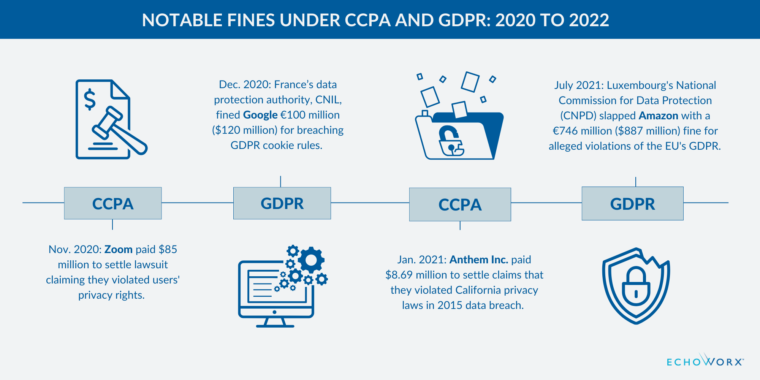CCPA vs GDPR: Understanding the Landscape of Data Privacy

In the evolving landscape of cybersecurity, two significant regulations have emerged to protect individuals’ data privacy: The California Consumer Privacy Act (CCPA) and the General Data Protection Regulation (GDPR).
These regulations are not only reshaping business practices but also redefining the individual’s relationship with their personal data. It’s this transformative impact that keeps GDPR and CCPA at the forefront of discussions, with their relevance maintained for several reasons:
- Constant Evolution: Data privacy regulations such as GDPR and CCPA are continuously evolving to keep up with the rapidly changing digital landscape. As these laws are updated and expanded, businesses must stay informed to remain compliant.
- Global Impact: These regulations have set global benchmarks for data privacy, influencing legislation in other countries. This worldwide impact keeps them in the spotlight.
- Compliance Challenges: Many businesses still struggle with achieving and maintaining compliance with these complex regulations, keeping them a hot topic of discussion.
- Penalties: The hefty fines associated with non-compliance grab headlines and draw attention to these regulations.
- Data Breaches: High-profile data breaches highlight the importance of robust data protection measures, further emphasizing the relevance of GDPR and CCPA.
Let’s delve into what these regulations mean for businesses and individuals alike.
Understanding CCPA: The California Consumer Privacy Act
The CCPA is a state statute intended to enhance privacy rights and consumer protection for residents of California, USA. It mandates businesses to disclose what personal information they collect, why they collect it, and with whom they share it. Failure to comply can lead to hefty fines and legal repercussions.
Exploring GDPR: The EU’s General Data Protection Regulation
On the other hand, the GDPR, an EU regulation, has a broader reach. It applies to any organization, regardless of its location, that processes the personal data of EU residents. It mandates businesses to protect the personal data and privacy of EU citizens for transactions occurring within EU member states. Non-compliance can result in severe financial penalties.
Key Differences between CCPA and GDPR: A Comparative Study
When comparing CCPA and GDPR, there are several key differences to note. While both have the same underlying objective—protecting personal data—their scope, technical requirements, fines, and penalties vary significantly.
Territorially, GDPR has a broader scope as it impacts any organization handling EU residents’ data, while CCPA applies strictly to businesses operating in California. From a technical perspective, GDPR requires explicit consent before data collection, whereas CCPA allows consumers to opt-out of data selling. In terms of penalties, GDPR’s fines can reach up to 4% of annual global turnover or €20 million (whichever is higher), while CCPA imposes a maximum fine of $7,500 per intentional violation.
To illustrate the variance in fines, let’s look at some of the notable fines under both CCPA and GDPR regulations from 2020 to 2022:

These examples underscore the financial risks businesses face if they fail to comply with these data privacy regulations.
Don’t miss out on our upcoming webinar: “Navigating the State of Privacy in 2023“. Tune in for expert insights from Forrester. Be proactive, not reactive!
Echoworx’s Role in Ensuring Compliance with CCPA and GDPR
In the complex world of data privacy regulations, Echoworx plays a critical role by offering robust email encryption solutions. Our offerings ensure that personal data transmitted via email remains secure – a necessary measure for businesses to comply with data security requirements under both CCPA and GDPR.
But our commitment to data protection goes beyond encryption. The physical location of data storage, also known as data residency, is another significant aspect of compliance. Recognizing this, Echoworx steps up to the challenge with our global data centers, further fortifying our comprehensive approach to adhering to regulations like CCPA and GDPR.
Echoworx provides data residency options that allow businesses to choose where their encrypted data resides. With our global data centers, we offer an array of options to meet the diverse data residency requirements of businesses operating across different regions. This flexibility not only ensures compliance with data privacy laws but also adds an extra layer of security by allowing businesses to store data closer to home, reducing the risk associated with cross-border data transfers.
Whether you’re a North American business needing to comply with CCPA or a European organization under the purview of GDPR, Echoworx’s data residency options provide a solution tailored to your needs. By choosing Echoworx, you’re not just opting for top-tier email encryption, but a comprehensive data protection strategy that considers every aspect of data privacy and compliance.
In the age of digital transformation, understanding and adhering to data privacy regulations like CCPA and GDPR is crucial. As we continue to share and store more of our lives online, the need for robust data protection measures has never been more important. So, take the first step towards safeguarding your data privacy today with Echoworx.
